Based on medical marijuana, Delaware may not be ready to oversee recreational industry
The pandemic sparked a wave of medical marijuana sales in Delaware.
More Delawareans sought medical cannabis than ever before. More products were available. And now, more dispensaries are set to open.
This rapid growth in sales has laid bare several issues patients continue to face: Prices remain high for products and access and supply are still limited, according to interviews with patients and advocates.
Despite sales reaching new heights – they increased 250% since the pandemic began – the state commission responsible for providing oversight of the industry has no authority and has done little to assess the medical marijuana dispensaries and offer improvements.
This explosion has occurred at a potentially transformative time. Delaware lawmakers are considering legislation to legalize recreational marijuana, which would undoubtedly impact the medical marijuana industry.
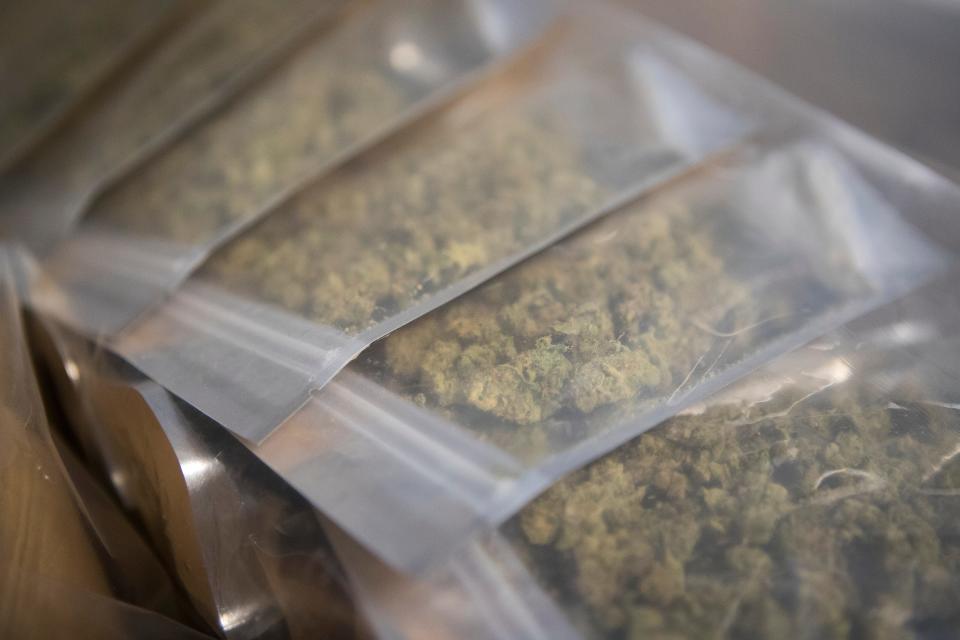
DELAWARE POLITICS: Delaware House passes bill to legalize possession of marijuana in historic vote
Patients and advocates believe the creation of the recreational industry would improve its medical counterpart by adding competition, providing greater accessibility, and offering more variety of products and better prices.
“When we're going in to purchase our medicine, there's strain-specific needs that each and every one of us has to find and that's not available at every dispensary across the board,” said Lillyanne Ternahan, executive director of the Delaware Cannabis Patients Coalition.
“It's almost as if they don't take us seriously. ... We're seen as these weak, frail patients.”
But one of the major players in the state’s medical marijuana industry says the regulation bill before the General Assembly could hurt their business.
And now it’s lobbying against aspects of it.
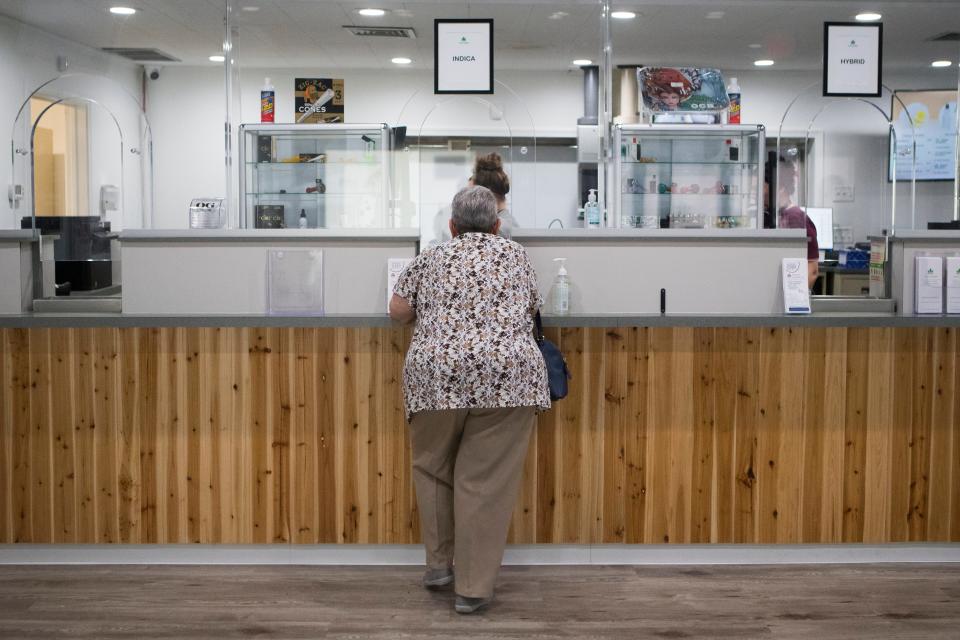
A growing market
When Mary Dougherty lived in Arizona, she likened her local dispensary to a 7-Eleven.
Everything she needed to treat her fibromyalgia and chronic pain was always there – food products, soaps and creams. It was dependable. Her pain can be so unbearable that she’s forced to spend weeks at home.
Since moving back to Delaware, Dougherty said she has struggled to find the same products of the same quality. There’s not a lot of variety and the edibles, she noted, aren’t as strong. Edibles also weren’t available to Delaware cardholders until recently.
And when she walks in for her regular pick-up, it’s common for her go-to products to not be available.
“They do switch a lot,” the 69-year old Wilmington resident said. “It’s just confusion. You got to start testing again, like what's gonna work best for you.”
Dougherty is the quintessential Delaware medical marijuana patient: A 60-something woman from New Castle County who struggles with chronic pain.
The patient population grew about 38% during the course of the pandemic, with more than 14,500 medical cannabis users as of February, according to state data. People aged 50-69 make up the biggest age group.
Sales grew by 250% in the past three years.
Paul Hyland, director of the Office of Medical Marijuana, said the pandemic resulted in a significant number of people applying for patient cards, which “somewhat caught us off guard.”
It also resulted in people panic-buying, leaving dispensaries facing shortages in the early months of the pandemic. Unlike a pharmacy, cannabis patients don’t call in prescriptions to a nearby dispensary.
They’re dependent on what the dispensary has in stock on a given day, which can leave some experimenting with products and strains they’ve never used before.
Delaware’s market was, for years, dominated by just three players and a handful of dispensaries scattered throughout the state. Now, five more compassion centers are expected to open by the end of the year, including the first in western Sussex County.
The state put out a call for proposals in 2020, which eventually led to the approval of three more medical marijuana growers to open. But since then, only one, The Farm, has successfully done so.
The other two dispensaries, Hyland said, have had issues with zoning or capital. It often takes two years for a dispensary to open, he added.
Delaware has a vertically integrated licensing process, which means the dispensary is responsible for overseeing the entire process – growing, processing and then selling the product.
“Our hope is that we get organic Delaware businesses,” Hyland said. “But it doesn't work out that way.” Hyland said not many local business owners could “pony up that kind of money,” resulting in compassion centers being dependent on investor groups.
Columbia Care has the largest presence in Delaware, with three locations in the state. The company, which has facilities throughout the country, was recently bought by Illinois-based Cresco Labs. It will soon become one of the largest cannabis producers and retailers in the country.
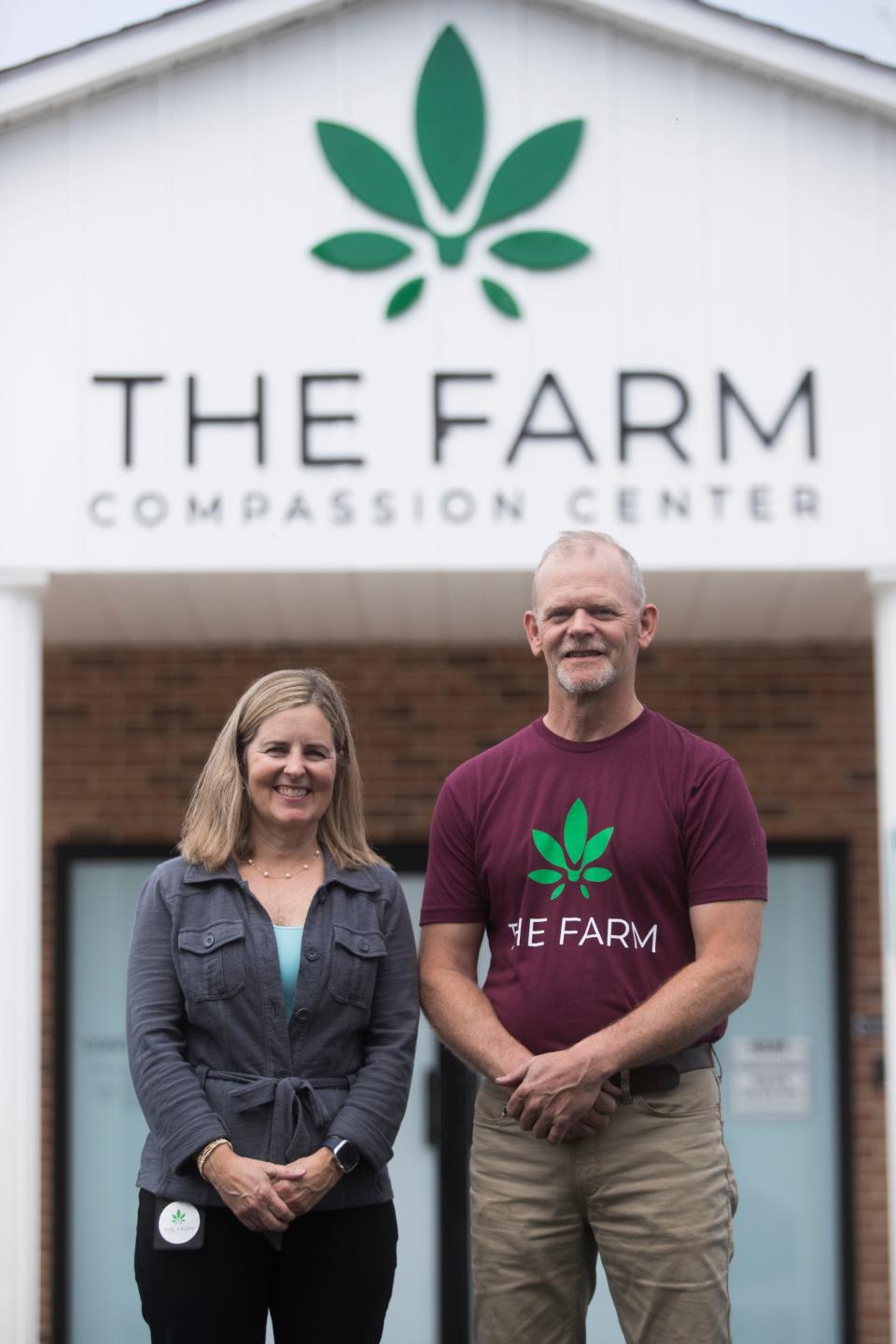
The Farm, based in Felton, has been open for less than a year and is the only 100% locally owned dispensary in Delaware. It was founded by Bill Rohrer and Jennifer Rohrer Stark, brother and sister, who plan to open a New Castle County location later this year.
“It's a lot of hard work,” Rohrer Stark said. “Just looking at the numbers and how big the industry is, it doesn't reflect how tough it is to get started.”
Because marijuana is classified as a schedule I substance under the federal Controlled Substances Act, banks will refuse prospective dispensaries for loans.
“Everything has got to be paid for if you want to be playing in the medical marijuana field,” Rohrer said. “We've gone all in with our personal life savings to make this work.”

Smoke and mirrors
When patients raise concerns about the medical marijuana industry, the state has taken little action.
The state commission that was created to make recommendations on how to improve access for patients, the effectiveness of compassion centers and sufficiency of safeguards and regulations hasn't done so, according to a recent state report.
The Medical Marijuana Act Oversight Commission has failed to make recommendations to the General Assembly or governor’s office, and doesn’t act on issues raised by the public, the report found. It’s common for meetings to fail to meet quorum among its members.
In six years, it has only made two recommendations, according to the report. This commission does not investigate or inspect dispensaries. That’s the job of the Office of Medical Marijuana, which has a staff of four full-time employees.
“Without additional legislative action or a strategic plan, the oversight committee is not meeting a public need,” the report said.
The commission is currently under review by the Joint Legislative Oversight and Sunset Committee, which studies the effectiveness of different government agencies and groups. The report is part of that review.
The committee has the option to draft legislation to disband the oversight commission, though it’s unclear what the path forward will be.
“Patients’ concerns have been completely dismissed or minimized,” said Zoe Patchell, the executive director of Delaware Cannabis Advocacy Network, who has attended these meetings.
She said patients have felt ignored and frustrated by the state, resulting in some to go back to buying marijuana illegally.
Rep. Jeff Speigelman, a member of the Sunset Committee, said during a March 11 meeting that his constituents have contacted him “absolutely, positively irate” about the lack of product availability at dispensaries.
It’s a “serious problem,” the Clayton Republican said, when people don’t have access to the specific medicine they need. The lawmaker expressed frustration with how the oversight committee said that it has no control over this issue.
“Sales are going up and people have dropped out of the program to go back to the black market to get what they want,” he said. “That is one of my biggest problems here. I'm not totally sure what this organization does.”
Patients want to keep the commission, but revamp it with new members and responsibilities. The commission, several said, is one of the few places cannabis patients can go to raise concerns, even if it is ineffective.
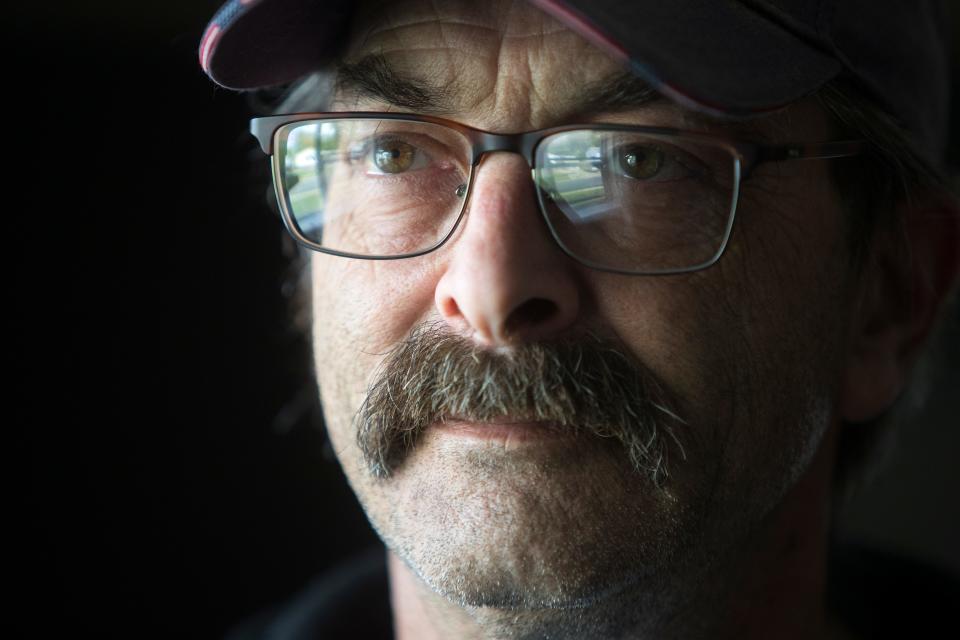
This includes Michael Wirtschafter, Air Force veteran and Bear resident, who credits medical marijuana for helping him to no longer be dependent on highly addictive opiates for his chronic pain.
Wirtschafter said he has raised issues to the commission about the prices in Delaware – and the concern that the same product costs more here than in neighboring states.
He said his concerns often go unaddressed. The Sunset Committee report noted the commission failed to act on any issues raised by residents, mostly because it lacks the authority to do so.
“If this (commission) falls apart, and there's no oversight,” Wirtschafter said, “the dispensaries can basically do as they want. There will be no recourse or no communication device for the patients to address it.”
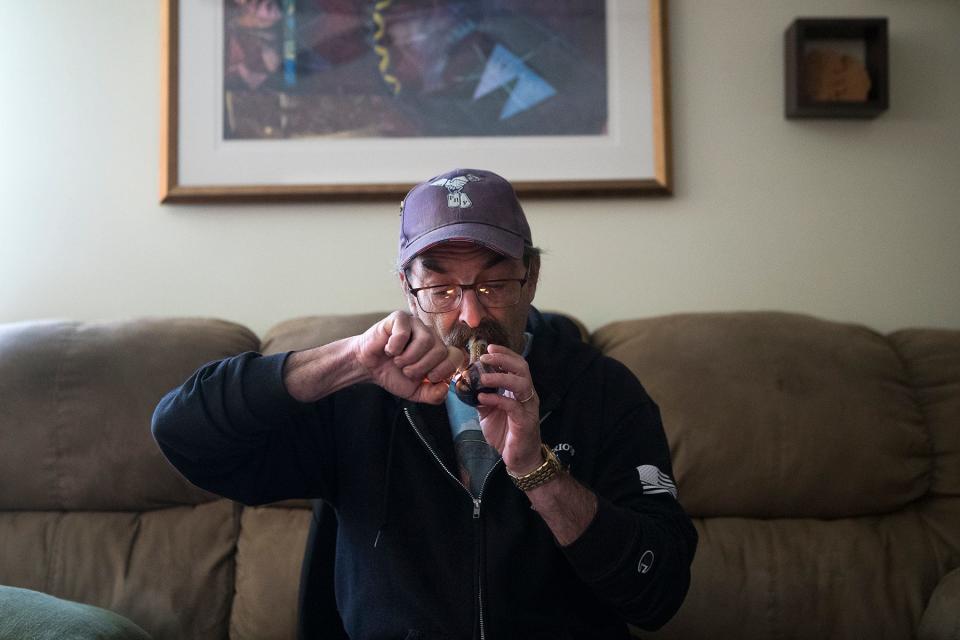
Puff, puff ... pass?
It’s become increasingly likely that the Delaware General Assembly will legalize marijuana this session.
But vote to regulate it? That remains unclear.
In the past five years, the General Assembly has failed multiple times to pass any type of recreational marijuana legislation. It made significant progress the first week of May, when the House passed a bill that removes all penalties for adults 21 and older possessing 1 ounce or less of weed. It now makes its way to the Senate, where it is expected to pass.
INSIDE LEG HALL: Despite failures, can Delaware vote to legalize marijuana in 2022? There's still a chance
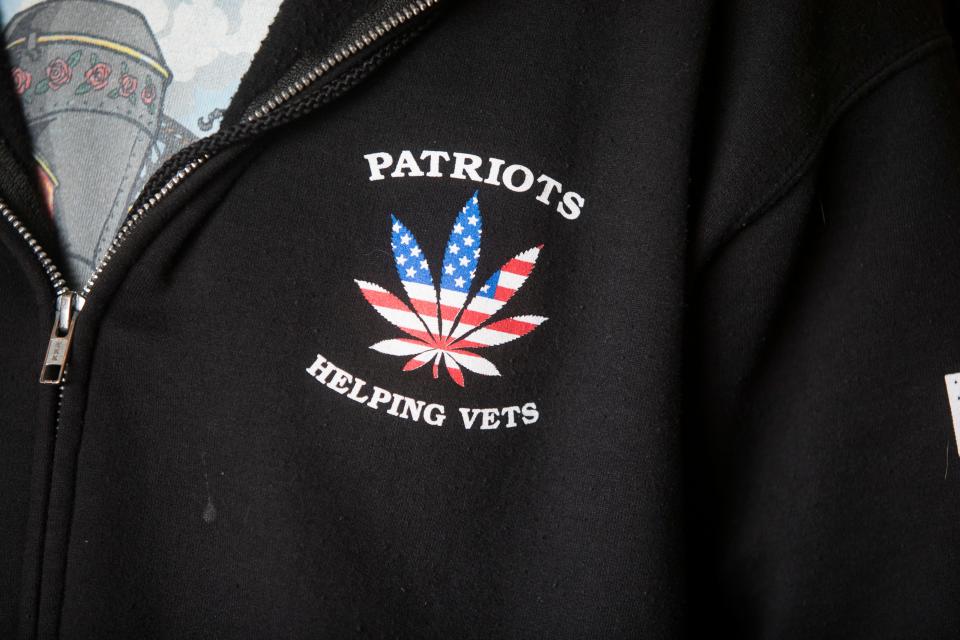
This comes after a failed attempt in March, which led lawmakers to split the bill in two. The legalization bill just requires a simple majority, while the regulation bill – which would lead to the creation of recreational dispensaries – requires a three-fifths vote. Democrats have consistently failed to meet this threshold with previous bills.
Yet there are some signs that regulation could potentially pass: Two House lawmakers, one Democrat and one Republican, who did not vote for the March bill, supported the most recent version when it was before the revenue and finance committee.
But Gov. John Carney remains strongly against legalization efforts. It's unclear if he would veto any bills that pass both chambers.
Throughout negotiations over recreational marijuana, the General Assembly Black Caucus has remained steadfast that the legislation include significant social equity components – specifically by prioritizing dispensary ownership by people of color and allowing those who have been convicted of marijuana offenses to be able to get a recreational business license.
As of now, there do not appear to be any minority-owned medical marijuana dispensaries operating in the state. CannTech, which the state describes as a minority- and veteran-run business, a received a license in 2020. It is expected to open dispensaries in Dover and Georgetown later this year.
The lack of diversity in Delaware’s medical marijuana industry is why the bill’s social equity component is non-negotiable for many activists and lawmakers, said Andrea Brown-Clarke, a Delaware cannabis patient and activist.
“If I'm going to the spaces and the people who look like me have no space in those places, then it's frustrating to see,” said Brown-Clarke, who is Black. “I'm giving my money to a business that does not acknowledge me as an equal.”
Brown-Clarke, along with several other patients, said the legalization of recreational marijuana would better the medical marijuana industry, believing it would boost competition, with local and minority ownership a key tenet of the legislation.
This, they argue, will ultimately result in better prices and more product availability. Medical marijuana is not covered by most insurers, which means people have to pay out of pocket.
This makes it even more difficult for low-income residents to get the medication they need, advocates said.
Ben West, a resident of historic New Castle, said he has to bartend in addition to his full-time job as a nurse in order to afford his medical marijuana. He is diagnosed with PTSD and uses it for dream suppression.
He said a 1 gram vape cartridge costs him $100. He buys at least two a week.
According to state data, the average price of 1 ounce and 1 gram of medical marijuana is $340 and $12, respectively. This ranks Delaware in the top half of all states in terms of most expensive medical marijuana prices. But this data showed that the First State has one of the least expensive prices in the region.
The states with the five cheapest prices have all legalized recreational marijuana.
Ngiste Abebe, vice president of public policy at Columbia Care, attributed price differentials to state’s respective rules and regulations. Because of federal laws, dispensaries can’t sell the same products over state lines.
“It's not always reasonable to compare between different states with different markets that have different numbers of cultivators, different numbers of patients,” Abebe said. “There's a lot more to this than just what is the price of an ounce.”
Columbia Care, which has the biggest medical marijuana footprint in Delaware, “strongly supports the market expansion and equitable adult-use legalization,” Abebe said.
But the company is lobbying against aspects of the bill. It’s against the idea that a locality can opt out of having cultivators or manufacturers, and that the dispensaries would have to compete for separate recreational licenses.
LEGAL WEED: What to know if you're thinking of buying recreational marijuana in New Jersey
In its recent recreational marijuana launch, New Jersey gave a jumpstart to medical marijuana dispensaries, called alternative treatment centers, by giving them licenses to sell recreational weed. There’s also plans to help small businesses break into the market.
If the Delaware legislation passes, the state would authorize an initial 30 retail store licenses, 30 manufacturing licenses, 60 cultivation licenses and five testing facility licenses. It would be regulated by a newly created Office of Marijuana Control Commissioner, separate from the Office of Medical Marijuana.
Rep. Ed Osienski, a Newark Democrat who has spearheaded legalization efforts, said last month he’s against the idea of bill language that would guarantee dispensaries have access to recreational licenses.
Giving compassion centers a “head start,” he said at a House committee hearing, would give these businesses time to make investments and ramp up necessary infrastructure more than a year ahead of other applicants.
WANT TO GET BAKED: These Delaware brownies and cookies have a little more than flour and sugar
“It would give them just a huge advantage,” the lawmaker said. “I didn't think it was fair.”
Columbia Care disagrees. Abebe, the vice president, said this would require the medical dispensaries to re-compete for a license which will be “costly.” She said this could force the dispensaries to “inherently pass those costs on to patients in some way.”
The company also believes open competition will hurt social equity applicants’ chances of getting a license. But the bill is written so that social equity licensees are in their own pool of applicants.
Mark Lally, CEO of First State Compassion, isn’t scared of the possible competition. His organization is making preparations to deal with the likely reality of recreational marijuana becoming legal.
“If competition comes,” he said, “that’s just going to make us better.”
Staff writer Patricia Talorico contributed reporting to this article.
Contact Meredith Newman at (302) 256-2466 or at mnewman@delawareonline.com. Follow her on Twitter at @MereNewman.
This article originally appeared on Delaware News Journal: Why patients struggle to get medical marijuana in Delaware

